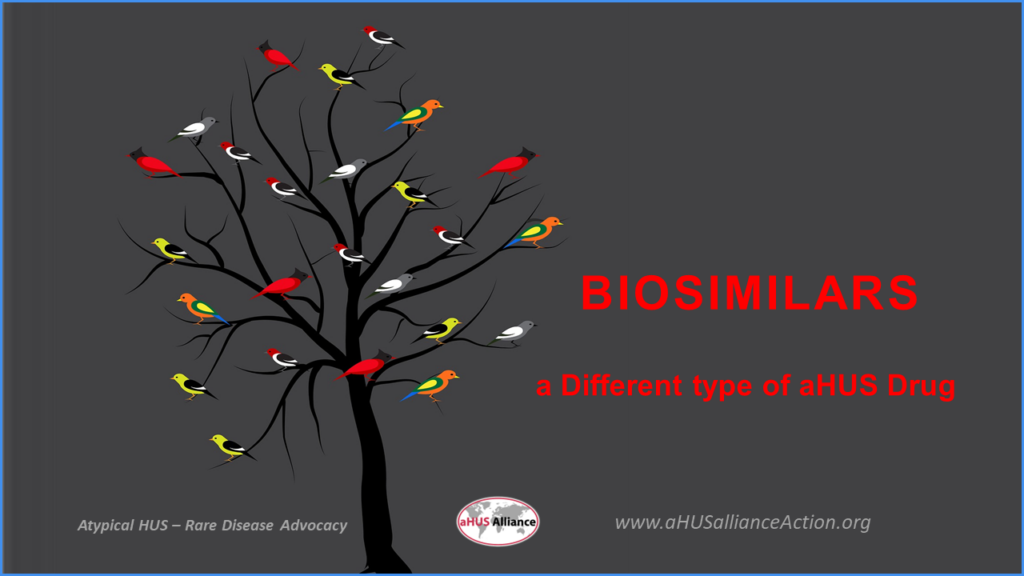
Every patient wants safe and effective drugs that are accessible and offered an affordable price point. For people diagnosed with aHUS, or atypical hemolytic uremic syndrome, there are currently two approved treatments which are available. But that good news has a catch – high drug prices mean that a majority of countries have not included one (or both) as accepted therapeutic options within their national healthcare systems.
Consumers know that factors such as product ingredients and manufacturing costs figure into what they can expect to pay in the marketplace. That’s true for drug costs as well. Both eculizumab (Soliris®) and ravulizumab (Ultomiris®) are complement inhibitors which are products of Alexion Pharmaceuticals /AstraZeneca Rare Disease. Both fall within a class of drugs called ‘biologics’ which are created from natural, living systems such as plant or animal cells. The process to manufacture biologic drugs is complex and challenging, compared to more commonly used conventional drugs which can be made (chemically synthesized) by combining certain amounts of specific ingredients formulated in a laboratory.
Pharmaceutical companies put a lot of time and effort into drug research and development, and clinical trials are a vital step to ensure a drug is both safe and effective. Once approved by regulators, the company’s intellectual property and investment in a new drug is protected for a certain number of years. When that patent expires for a conventional drug, making a generic version of this traditional drug type is relatively simple so it can soon be offered to consumers at a lower price. Endeavoring to make such a ‘work-alike’ version of any biologic drug is very difficult, since part of that complex process involves replicating aspects of a living microorganism or cell. Following a chemical formula to compound a conventional drug is quick and inexpensive, but creating a “biosimilar’ to an existing biologic drug (known as the reference drug) is difficult and therefore will come to market at a high price point.
Biosimilars in the aHUS arena: Scientific advancements occur continuously, so staying current is an ongoing task. In the case of eculizumab (Soliris®), the Russian Generium Pharmaceuticals biosimilar Elizaria has been available to a limited market already. Although Amgen had its biosimilar (ABP-959, aka Bekemv®) to eculizumab approved in Europe for patients with PNH, a legal filing by Alexion prevents Amgen from supplying its biosimilar Bekemv® to medical outlets in Germany unless certain conditions are met (see 10 Aug 2023 article). Samsung Bioepis created its biosimilar to eculizumab (SB12, aka EPYSQLI® ) and received marketing authorization for patients with PNH by the European Commission (EC) on May 26, 2023 but its launch date is not yet known. The newcomer in this niche field of biosimilars is Turgut Ardika, just starting its NCT05863442 Phase 1 clinical trial of TUR03 as of April 2023.
Drug prices drive drug access. A high-cost drug may transform (or even save) lives of atypical HUS patients, but there are only a handful of aHUS patients per million population. Given such small patient populations, it’s understandable that many nations take the stance of serving the majority of their citizens with utilization of more commonly prescribed and/or lower priced drugs. Biosimilars will come to market at a lower cost than the original biologic reference drug, but still at a significantly higher price point than conventional drugs due to unalterable factors such as manufacturing costs. We’re hopeful that new therapeutic options, to include biosimilars, will leverage important discoveries and insights to build even brighter futures for those with aHUS and other rare diseases. In the end no matter how effective and transformational a new drug might be, it is of little value if the drug’s high cost or restricted use place it beyond the reach of physicians and their patients.
aHUS drug Candidates: Take a deep dive into the aHUS therapeutic drug landscape, with our article on the 2022 pharma overview and horizon scan report. https://bit.ly/aHUS2022drugReview
More About Biosimilars
Initiative to Support Access to Biosimilars
‘Act 4 Biosimilars’ Action Plan Seeks to Increase Patient Access to Biosimilars Globally
US Food & Drug Association – Info & Resources on Biosimilars (new, March 2023)
USFDA: Biosimilar Basics for Patients
NHS England Biosimilar medicines (note the cost reference)

